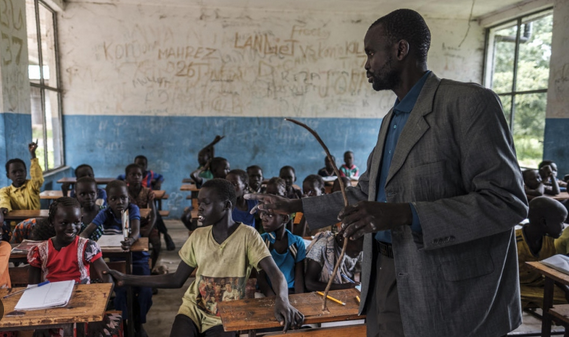The education ministry in Jonglei State has stopped teachers employed by the government from moonlighting in private schools, citing poor performance.
Gabriel Deng Ajak, the state education minister, told Radio Tamazuj over the weekend that the decision was taken because government-employed teachers prefer the private sector while still on the public payroll and the poor performance of government schools.
“It is not wrong for teachers to teach in private schools but it is their choice to abandon one job and keep the other,” he said. “I expect them to make a choice whether to go to private schools or remain with us in public schools because you are a single human and cannot divide yourself into two. We have people who are ready to teach regardless of the current pay but they are being blocked by teachers who are both in public and private schools.”
The minister admitted that teachers are poorly paid by his ministry but that they should remain loyal to the government in the spirit of patriotism.
“The government is working round the clock to increase their salaries. We are not saying that this situation will temporarily remain the way it is and that they get this little pay but with time they will get more than the private schools pay,” Deng said. “Our plans are just being frustrated by the current economic situation. In 2012, government employment was more attractive than the private sector and we will get back there. So, the current challenge should not diminish your spirit of patriotism.”
He said he has so far dismissed two school principals during his ongoing school inspection exercise.
“Last Monday, I dismissed the principals for Bor A and Bor B primary schools and their deputies because they allowed teachers to sign in in the morning and teach in private schools in the afternoon, leaving pupils outside playing without being taught,” Deng said. “Later in the afternoon, they would come back to sign out as if they had been teaching. This is a forgery.”
For his part, Ruben Matiop Mayol, the head of the state teachers’ union, said the decision by the state education ministry was inappropriate and should be reconsidered.
“What the minister said is not right. The reason teachers go for both private and public schools is that teachers can not sustain their families by being in public schools. Another reason is that teachers are not getting the services they were supposed in public schools,” he explained. “For example, our salaries were increased by 40 percent by the national ministry but this is not being implemented in Jonglei State. While we claim our rights, some of us are jailed, threatened and the union was dissolved.”
A school teacher, Yuang Arou, said they would protest the decision.
“Teachers are teaching in private schools because there are no services at public schools. Even Vice President Hussein Abdelbagi saw it for himself when he was in the state,” he said. “There are malpractices in the ministry and a teacher only gets about SSP 20 000 while some private schools are paying up to 200,000 300,000. How can a teacher sustain themselves by being asked to remain at a public school with that amount?”
Efforts to reach the dismissed principals were futile.




